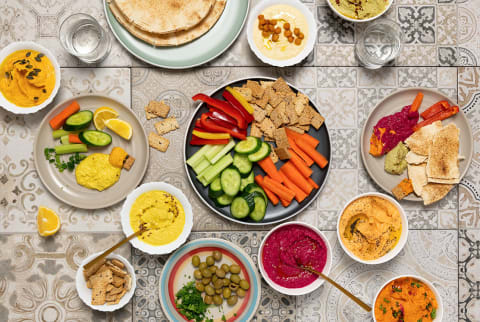Advertisement
Ward Off Depression & Anxiety With These Key Foods, Drinks & Nutrients


Depression and anxiety are as conventional as the common cold these days. Whether you've struggled with clinical depression or anxiety for years or have experienced bouts of one (or both) alongside stress or chronic illness, these neuropsychiatric disorders are all but unavoidable.
Thanks to research on the gut-brain axis, scientists have found that our diet and overall gut health play a significant role in mental well-being—and a new Antioxidants narrative review breaks down exactly which foods, drinks, and nutrients have been found to prevent and manage depression and anxiety symptoms.
How diet can help prevent & manage depression & anxiety
Whether you've personally dealt with these neuropsychiatric disorders or have witnessed a family member, friend, or peer fight their own mental health battles, everyone is affected by depression and anxiety in some shape or form.
Whole foods and nutrients like fish, coffee, tea, berries, omega-3 fatty acids, antioxidants (e.g., lycopene, resveratrol, selenium), and even dietary fiber have been found to play a critical role in the prevention and management of depression and anxiety.
These nutrients and foods help promote mental well-being by:
- Inhibiting inflammation
- Fighting free radicals to reduce oxidative stress
- Modulating gut microbiota
- Preventing hyperactivity of the hypothalamic–pituitary–adrenal (HPA) axis—i.e., the neuroendocrine mechanism that controls the body's reaction to stress
- Supporting healthy levels of monoamine neurotransmitters (serotonin, dopamine, and norepinephrine), which play a key role in mood regulation
Foods, drinks, and nutrients for depression
Pathologically, depression is often associated with inflammation in the brain, monoamine neurotransmitter deficiency, gut microbiota disorder, and HPA axis hyperactivity.
Consumption of the following foods, drinks, and dietary nutrients have been found to lower the risk of depression and depressive symptoms in clinical trials:
- Fish
- Fatty fish
- Fatty fish
- Mushroom fiber
- Walnuts
- Green tea
- Tea
- Coffee
- Dietary fiber
- Selenium
In animal studies, many common nutrients and supplement ingredients—including fish oil and omega-3s, navel orange and garlic essential oils, antioxidants (e.g., curcumin, lycopene, resveratrol, maqui berry, and EGCG), and various probiotic strains—have also been found to protect against and treat depressive mechanisms.
Foods, drinks, and nutrients for anxiety
According to the narrative review, anxiety is initiated and developed by oxidative stress, inflammation, and serotonergic and noradrenergic dysfunction (i.e., imbalances in serotonin and noradrenaline, aka norepinephrine)—but certain foods and nutrients can help.
Consumption of the following foods, drinks, and dietary nutrients have been found to lower the risk of and protect against anxiety in clinical trials:
- Legumes and nuts
- Dietary fiber
- Omega-3 fatty acids
- BCAAs
- Vitamin B6
In animal studies, a variety of foods, nutrients, and common supplement ingredients—such as honey, goat milk fat, breadfruit pulp, red pomegranate fruit extract, bergamot essential oil, omega-3s, phytonutrients (e.g., saffron, curcumin, and L-theanine), and various probiotic strains have also been found to reduce the prevalence and treat the effects of anxiety.
The takeaway
There are a number of neuroprotective foods, drinks, and nutrients you can add to your diet to help prevent and/or manage depression and anxiety. For an even easier solution, consider adding a quality supplement with one (or many!) of the ingredients listed above to your daily routine.
Here are some of mindbodygreen's supplement roundups to get you started (plus, which ingredients to look for):
- The best metabolism supplements for green tea extract (with caffeine and EGCG) and resveratrol
- The best omega-3 supplements for marine-derived omega-3s EPA and DHA
- The best multivitamins for selenium, vitamin B6, lycopene, and resveratrol
- The best focus & concentration supplements for caffeine, L-theanine, vitamin B6, resveratrol, omega-3s, and probiotics
- The best fiber supplements for a healthy dose of dietary fiber
